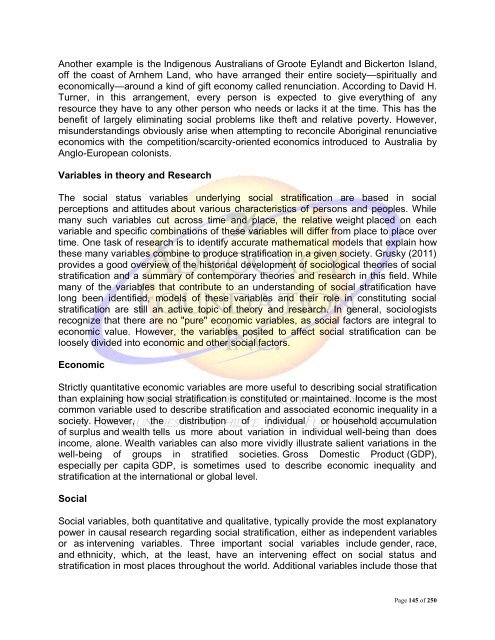Institutional Racism
Institutional Racism
Institutional Racism
Create successful ePaper yourself
Turn your PDF publications into a flip-book with our unique Google optimized e-Paper software.
Another example is the Indigenous Australians of Groote Eylandt and Bickerton Island,<br />
off the coast of Arnhem Land, who have arranged their entire society—spiritually and<br />
economically—around a kind of gift economy called renunciation. According to David H.<br />
Turner, in this arrangement, every person is expected to give everything of any<br />
resource they have to any other person who needs or lacks it at the time. This has the<br />
benefit of largely eliminating social problems like theft and relative poverty. However,<br />
misunderstandings obviously arise when attempting to reconcile Aboriginal renunciative<br />
economics with the competition/scarcity-oriented economics introduced to Australia by<br />
Anglo-European colonists.<br />
Variables in theory and Research<br />
The social status variables underlying social stratification are based in social<br />
perceptions and attitudes about various characteristics of persons and peoples. While<br />
many such variables cut across time and place, the relative weight placed on each<br />
variable and specific combinations of these variables will differ from place to place over<br />
time. One task of research is to identify accurate mathematical models that explain how<br />
these many variables combine to produce stratification in a given society. Grusky (2011)<br />
provides a good overview of the historical development of sociological theories of social<br />
stratification and a summary of contemporary theories and research in this field. While<br />
many of the variables that contribute to an understanding of social stratification have<br />
long been identified, models of these variables and their role in constituting social<br />
stratification are still an active topic of theory and research. In general, sociologists<br />
recognize that there are no "pure" economic variables, as social factors are integral to<br />
economic value. However, the variables posited to affect social stratification can be<br />
loosely divided into economic and other social factors.<br />
Economic<br />
Strictly quantitative economic variables are more useful to describing social stratification<br />
than explaining how social stratification is constituted or maintained. Income is the most<br />
common variable used to describe stratification and associated economic inequality in a<br />
society. However, the distribution of individual or household accumulation<br />
of surplus and wealth tells us more about variation in individual well-being than does<br />
income, alone. Wealth variables can also more vividly illustrate salient variations in the<br />
well-being of groups in stratified societies. Gross Domestic Product (GDP),<br />
especially per capita GDP, is sometimes used to describe economic inequality and<br />
stratification at the international or global level.<br />
Social<br />
Social variables, both quantitative and qualitative, typically provide the most explanatory<br />
power in causal research regarding social stratification, either as independent variables<br />
or as intervening variables. Three important social variables include gender, race,<br />
and ethnicity, which, at the least, have an intervening effect on social status and<br />
stratification in most places throughout the world. Additional variables include those that<br />
Page 145 of 250

















